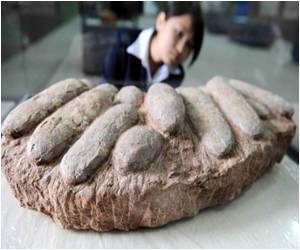One of the most mythical yet least visited spots in the f the eastern corner of Turkmenistan and unknown to the outside world and is an eight hours dusty drive from the nearest major settlement

"Steven Spielberg should have shot 'Jurassic Park' here. Here the tracks of the dinosaurs are real and not made by computers," said Aman, 35, an inhabitant of the village of Khodja Pil at the foot of the plateau.
On the plateau, some 2,500 dinosaur tracks have been discovered. Some are 40 centimetres long and 30 centimetres wide, others even bigger, measuring 70 by 60.
A dinosaur five to six metres (16 to 20 feet) tall could take a stride of up to two metres.
The plateau is renowned for having the longest trackways -- continuous lines of footprints made as a dinosaur walked or ran -- anywhere in the world.
In places they reach up to 200 metres. It seems improbable that what is now an arid mountain zone could sustain such life but 150 million years ago when these creatures reigned supreme on Earth the eco-system was completely different.
"This sandy marshland quickly silted up and so these prehistoric tracks left their mark forever," said Anatoly Bushmakin, a Turkmen scientist specialising in the plateau.
"It is like the dinosaurs were here just recently and if you go up the mountain you can imagine that they are walking away into the distance," said Gulya, 27, a visitor from the nearest large town of Turkmenabat.
"It's amazing how everyone of us can somehow touch eternity," she added.
- 'Unique in the world' -
The Plateau is located deep in Turkmenistan's eastern corner on the border with Afghanistan and Uzbekistan.
Visiting the border region requires a permit.
A visitor from the capital Ashgabat on the other side of the country needs to fly to Turkmenabat before then travelling south by road some 450 kilometres (280 miles), a bumpy eight-hour journey.
It was only confirmed in the 1950s that dinosaur tracks existed here, although locals have known about them for much longer, even if they were not quite sure of the origin.
The name of the nearby village of Khodja Pil means "Miracle of the Elephants" in Turkmen.
Of course elephants have never existed in Turkmenistan but local legend long had it that the tracks were left by elephants taken by Alexander the Great in his campaigns.
"What is so unique about this plateau is that here precise tracks of dinosaurs have been preserved and you can even make out the toes and then follow the track even," said Bushmakin.
"Such a huge number of prints has not been found anywhere else on the planet," he added.
For all its remoteness, Turkmen officials have some hope of making the area a major draw. The plateau is located in the heart of the Koytendag National Park which is the location of Turkmenistan's highest mountain (Airybaba at 3,319 metres) as well as waterfalls, lakes and caves.
"Because of this the ministry of tourism in Turkmenistan is preparing a dossier to apply for the Koytendag national park to be declared part of UNESCO world heritage," said the head of the reserve, Mukhamet Imamov.
Source-AFP
 MEDINDIA
MEDINDIA


 Email
Email






